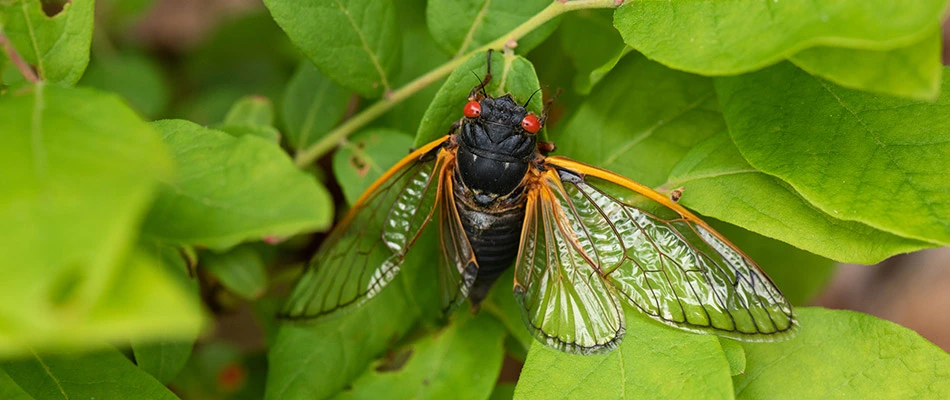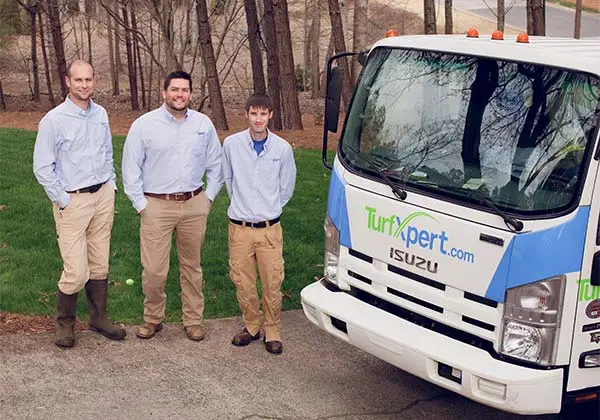It's that time once again when the Brood X cicadas appear by the thousands, buzzing and swarming over trees, plants, and shrubs. Brood X cicadas are periodical, meaning that each generation only emerges after maturing underground for 17 years. This generation has been maturing since 2004, meaning that they will emerge in 2021 in certain spots across the country.
Northern Georgia is just one of the areas that will be affected by these insects. If you reside in an area where Brood X cicadas are said to emerge, there is no need to worry about long-term damage to your property because they are not vegetation-eating locusts. However, they might cause some damage to young trees and fruit trees when they lay their eggs. Continue reading to learn more about the Brood X cicada life cycle and how to keep them away from your trees.
The Brood X Cicada Life Cycle

The generation of Brood X cicadas emerging in 2021 started all the way back in 2004. Here is an overview of the Brood X cicada life cycle:
- Once soil temperatures reach 64 degrees Fahrenheit, cicada adult males come out to mate.
- Female Brood X cicadas will make little slits in your trees and lay about 600 eggs that will hatch for about six weeks.
- These eggs hatch tiny, pale nymphs that drop from the trees and burrow into the soil.
- While underground, the nymphs will experience five developmental stages called instars. During this time, they feed on sap from the rootlets of trees as they mature.
- In April of their 16th year of maturing underground, the nymphs travel up to about four to six inches underground and wait.
- Finally, in May, the nymphs surface from their underground hole in droves, taking shape in their adult form.
Brood X cicadas protect themselves from cicada-feasting animals, such as birds, crows, and even cats and dogs, by emerging in overwhelming numbers. The sheer volume of surfacing cicadas exceeds the amount these animals can eat, which allows the remaining cicadas to breed in peace.

These cicadas are famous for their loud mating sounds, sometimes reaching up to 100 decibels.
How Brood X Cicadas Affect Your Trees
Cicadas pose no long-term threat to plants because they are not vegetation-eating locusts. Instead, while maturing, they will suck on twigs and small branches to feed on the sap. The only potential threat to your trees happens when female cicadas cut slits into the bark to lay their eggs. Well-developed trees are able to withstand this process, while younger trees and fruit trees might be more affected by this. Tree damage caused by egg-laying insects is called flagging and will cause your twigs to split, wither, and die, thus causing your branches to break.
How to Prevent Brood X Cicadas from Damaging Your Young Trees
If you have some young trees or even fruit trees on your property that you want to protect from the emergence of Brood X cicadas, netting is your best bet. Netting is a proven bug deterrent that is made up of a disposable plastic material and placed all the way around your trees or shrubs. This is a lot more favorable than using insecticides because, one, it is a non-chemical solution and, two, it is hard to pinpoint when female cicadas will want to lay their eggs within your trees. Therefore, correctly timing the insecticide treatment is difficult.
We provide professional tree and shrub care to the Woodstock area.
There is no need to worry about the emergence of the Brood X cicadas as they are not vegetation-eating locusts. Besides, once they emerge, they will only last a few weeks. However, if you do notice some damage on your young trees due to the female cicadas laying their eggs, call our team. Our professionals can help you identify the damage and offer curative solutions.
If you sign up for our comprehensive tree and shrub care program, you will receive 6 visits from our team every year. Throughout this program, we keep a very close eye on the health of your trees and shrubs. This includes inspecting for any cicada damage! If your home or business is located in the Woodstock, Georgia area, including Roswell and Alpharetta, give our office a call today at (833) 444-8873. We can help you keep your trees and shrubs protected year-round.



Comments (0)
Thanks for your comment!
Thanks for your feedback! Your comments have been successfully submitted! Please note, all comments require admin approval prior to display.
Error submitting comment!
There is a problem with your comment, please see below and try again.